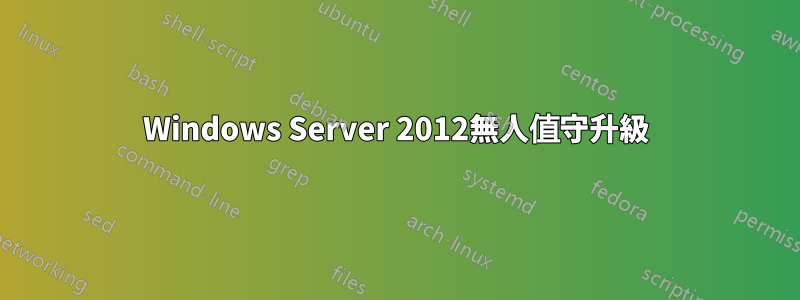
我剛開始使用 Windows Server 軟體,目前我們使用的是 Windows Server 2008 R2 資料中心。我們想升級到伺服器2012。
如何在windows伺服器上進行無人值守升級。我們無法實際存取該伺服器。我找到了有關如何執行無人值守安裝(磁碟擦除非升級)的說明,但我們如何升級?
答案1
按照上面的建議,這就是我所做的。
- 在虛擬機器中安裝了 Windows Server 2008R2 的試用版。
- 取得windows server 2012R2 Demo版
- 跟進了這篇文章windows-server-2012-無人值守(必須添加一些調整才能添加 IP)
使用此網站作為附加屬性的參考:windows-server-2012-自動安裝-設置
我可以透過 RDP 會話成功地將 Windows 2008R2 自動升級到 2012R2。
簡而言之,步驟是:
- 搜尋 Windows ADK(評估和部署工具包)(adksetup.exe 至少版本 8.100.26866)
- 執行安裝時,選擇部署工具和 Windows 預先安裝環境 (Windows PE)。
- 安裝後開啟:Windows 系統映像管理員。 (從開始功能表)
- 您需要存取 ISO 並找到 install.wim 原始檔(通常位於:[iso]\sources 內)
- 建立映像時,您需要選擇要使用的作業系統版本。
- 影像準備好後,您將需要開始將不同的設定新增至配置。
複製配置範例並命名自動無人值守.xml根據需要更新(使用工具或記事本,建議使用工具)來執行您將需要的升級:[windows 來源]\setup.exe /unattend:"\path\OS\Autounattend.xml"
配置範例
<?xml version="1.0" encoding="utf-8"?>
<unattend xmlns="urn:schemas-microsoft-com:unattend">
<settings pass="specialize">
<component name="Microsoft-Windows-Shell-Setup" processorArchitecture="amd64" publicKeyToken="31bf3856ad364e35" language="neutral" versionScope="nonSxS" xmlns:wcm="http://schemas.microsoft.com/WMIConfig/2002/State" xmlns:xsi="http://www.w3.org/2001/XMLSchema-instance">
<ComputerName>mysuperComputer</ComputerName>
<ProductKey>123-1234-12345-12345-XXXX</ProductKey>
<RegisteredOrganization>Somewhere</RegisteredOrganization>
<RegisteredOwner>Me</RegisteredOwner>
<TimeZone>Pacific Standard Time</TimeZone>
</component>
<component name="Microsoft-Windows-TerminalServices-LocalSessionManager" processorArchitecture="amd64" publicKeyToken="31bf3856ad364e35" language="neutral" versionScope="nonSxS" xmlns:wcm="http://schemas.microsoft.com/WMIConfig/2002/State" xmlns:xsi="http://www.w3.org/2001/XMLSchema-instance">
<fDenyTSConnections>false</fDenyTSConnections>
</component>
</settings>
<settings pass="windowsPE">
<component name="Microsoft-Windows-International-Core-WinPE" processorArchitecture="amd64" publicKeyToken="31bf3856ad364e35" language="neutral" versionScope="nonSxS" xmlns:wcm="http://schemas.microsoft.com/WMIConfig/2002/State" xmlns:xsi="http://www.w3.org/2001/XMLSchema-instance">
<SetupUILanguage>
<UILanguage>en-US</UILanguage>
</SetupUILanguage>
<InputLocale>en-US</InputLocale>
<SystemLocale>en-US</SystemLocale>
<UILanguage>en-US</UILanguage>
<UserLocale>en-US</UserLocale>
</component>
<component name="Microsoft-Windows-Setup" processorArchitecture="amd64" publicKeyToken="31bf3856ad364e35" language="neutral" versionScope="nonSxS" xmlns:wcm="http://schemas.microsoft.com/WMIConfig/2002/State" xmlns:xsi="http://www.w3.org/2001/XMLSchema-instance">
<UserData>
<ProductKey>
<Key>123-1234-12345-12345-XXXX</Key>
<WillShowUI>OnError</WillShowUI>
</ProductKey>
<AcceptEula>true</AcceptEula>
<FullName>Me</FullName>
<Organization>Me</Organization>
</UserData>
<ImageInstall>
<OSImage>
<InstallFrom>
<MetaData wcm:action="add">
<Key> /IMAGE/NAME</Key>
<Value>Windows Server 2012 SERVERSTANDARD</Value>
</MetaData>
<Path>\\SOMESERVER\Windows Server\install.wim</Path>
</InstallFrom>
<InstallTo>
<DiskID>0</DiskID>
<PartitionID>1</PartitionID>
</InstallTo>
</OSImage>
</ImageInstall>
<DiskConfiguration>
<WillShowUI>OnError</WillShowUI>
<Disk wcm:action="add">
<CreatePartitions>
<CreatePartition wcm:action="add">
<Order>1</Order>
<Size>1000</Size>
<Type>Primary</Type>
</CreatePartition>
</CreatePartitions>
<ModifyPartitions>
<ModifyPartition wcm:action="add">
<Active>true</Active>
<Extend>true</Extend>
<Format>NTFS</Format>
<Letter>C</Letter>
<Order>1</Order>
<PartitionID>1</PartitionID>
</ModifyPartition>
</ModifyPartitions>
<DiskID>0</DiskID>
<WillWipeDisk>true</WillWipeDisk>
</Disk>
</DiskConfiguration>
<WindowsDeploymentServices>
<Login>
<Credentials>
<Password>thisisasecret</Password>
<Username>Administrator</Username>
</Credentials>
</Login>
</WindowsDeploymentServices>
<UpgradeData>
<Upgrade>false</Upgrade>
</UpgradeData>
</component>
<component name="Microsoft-Windows-TCPIP" processorArchitecture="amd64" publicKeyToken="31bf3856ad364e35" language="neutral" versionScope="nonSxS" xmlns:wcm="http://schemas.microsoft.com/WMIConfig/2002/State" xmlns:xsi="http://www.w3.org/2001/XMLSchema-instance">
<Interfaces>
<Interface wcm:action="add">
<Ipv4Settings>
<DhcpEnabled>true</DhcpEnabled>
</Ipv4Settings>
<Identifier>1</Identifier>
</Interface>
</Interfaces>
</component>
</settings>
<settings pass="oobeSystem">
<component name="Microsoft-Windows-Shell-Setup" processorArchitecture="amd64" publicKeyToken="31bf3856ad364e35" language="neutral" versionScope="nonSxS" xmlns:wcm="http://schemas.microsoft.com/WMIConfig/2002/State" xmlns:xsi="http://www.w3.org/2001/XMLSchema-instance">
<RegisteredOrganization>-</RegisteredOrganization>
<RegisteredOwner>-</RegisteredOwner>
</component>
</settings>
<cpi:offlineImage cpi:source="wim:c:/temp/install.wim#Windows Server 2012 R2 SERVERSTANDARD" xmlns:cpi="urn:schemas-microsoft-com:cpi" />
</unattend>
答案2
我只需將 ISO 內容複製到桌面並使用簡單升級模式運行安裝程序,即可將任何 Server 2008R2 DC 伺服器升級到 2012R2 DC。我知道它不是無人值守的,但您將保持連線直到需要重新啟動。等待約 5 分鐘,您應該能夠重新透過 RDP 連線。
您首先需要確保您的 Windows 更新是最新的。我不會建議在生產伺服器上這樣做,除非您首先有備份並且有足夠的維護窗口來進行備份恢復,以防最壞的情況發生。


